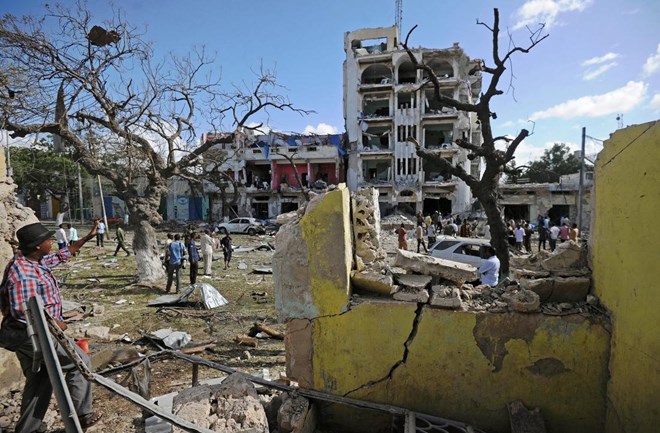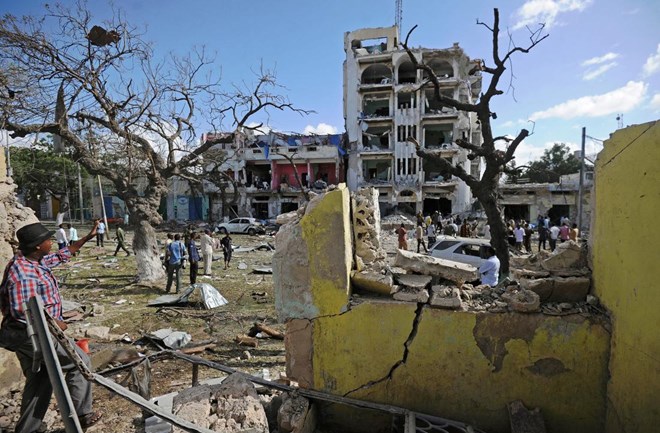
Wednesday June 15, 2016
Terrorists depend and capitalize on fear

People stand on the scene of a terror attack outside The Ambassador Hotel in Mogadishu on June 2, 2016. (Mohamed Abdiwahab—AFP/Getty Images)
The bomb went off at dusk just as everyone was preparing for evening prayer. I was only a few blocks away from its epicenter and felt the reverberation to my core.
A car bomb had been driven into Mogadishu’s Hotel Ambassador in Somalia as a precursor to a sustained attack by al-Shabaab gunmen that would last for several hours. The sound of sporadic gun-fire could be heard throughout the night. By the time we awoke, 16 people had been reported killed, including two parliamentarians. One of my co-workers was among the dead.
The attack occurred a few days before the advent of Ramadan and a day before a visit by Turkish President Erdogan that would mark Somalia’s development. The strategy behind this terror attack, like many others, was to spread an indelible fear among the public.
It has become increasingly clear over the past year that threats and fears of terror attacks has spread beyond the populations of terror-besieged cities like Mogadishu, Baghdad and Kabul to Brussels, Paris and London—and now to Orlando. One of the reasons the horrific massacre in Orlando is so inexplicable is because of where it happened: in a nightclub in a major U.S. metropolis. How do we deal with this idea that these acts can happen anywhere and to anyone?
A few months ago, I went to a local restaurant to meet a friend. It was packed with a large lunch-time crowd. It was an unusually cool day in Mogadishu, and everyone was out enjoying the reprieve from the normally sweltering summer heat.
The flow and ebb of conversation suddenly hiccuped to a stop as everyone turned to see a small Toyota roughly pull in front of the restaurant, backfiring a loud burp as it careened to a stop. For a few moments, no one exited the car as it idled silently. A collective panic slowly spread, and a few people nervously half-stood from their chairs, forks and spoons clattering to the ground, only to awkwardly fall back down when a stout woman in a bright yellow abaya finally stepped out of the car, waving back at the driver to leave. Relief. The sudden clatter of fallen dishes from the kitchens shattered the embarrassing silence, and conversation began again, over-energetic and slightly harried.
I put away my phone with shaking hands as I tried to calm myself from the piercing surge of adrenaline and the receding instinct to flee, of group panic. Like a skittish herd alerted to danger, we were all ready to run out that door. I signal to the waiter for my bill. Everyone in Mogadishu lives with the constant threat of terror in some sort of way—aware in the back of their mind that an idling car or a lone backpack may be a tool of destruction.
State response to terrorism is clear: increased security procedures, a proliferation of security checkpoints throughout the city and the appearance of towers of sand-bags along government buildings and hotels to protect against bombings. The recent bombing will spur discussions on Somali government counter terrorism strategies, from increased intelligence capacity to targeted attacks against al-Shabaab leaders.
Although I and many people around the world are affected by terrorism, sometimes on a daily basis, it is important that we choose not to be paralyzed or driven by it. Terrorist organizations depend and capitalize on fear.
In Mogadishu, normalcy is an act of resistance and a tool of defiance. People still go out to restaurants and cafes every day. They might, however, avoid high-profile locations where foreigners congregate. When parking, they make sure not to let their car out of their sight or have someone they trust watch it—bombs attached to parked cars is a popular method for assassinations and attacks. When there is news of an attack, a lunch or a meeting may be interrupted with a quick call to make sure friends and family are OK.
As the bodies of those killed in the hotel bombing are still being identified and families are burying their loved ones, I am trying to come to grips with how any of us can move forward from such a senseless tragedy, one perpetrated on a regular basis on innocent civilians.
Is simply moving on and reestablishing normalcy as an act of defiance enough? There are no easy answers. For me, and for many others around the world, we may live with terror, but we choose not to live in terror.









